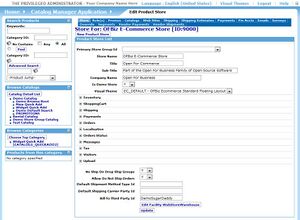Difference between revisions of "Working with the Product Store(s)"
(→For More Detailed Guidance) |
|||
| (One intermediate revision by the same user not shown) | |||
| Line 26: | Line 26: | ||
===For More Detailed Guidance=== | ===For More Detailed Guidance=== | ||
| − | In the | + | In the referenced section, we will discuss configuring the '''opentaps''' Virtual Store in it's basic definition, and in it's various policy details. Then in a later section we will discuss the configuration of the WebSite Store which can be configured to mirror the Virtual Store as a separate topic. |
| + | |||
| + | Refer to the section, [[Basics of Configuring the Product Store]]. | ||
| + | |||
| + | |||
| + | Manual Pages >> [[Basics_of_Configuring_the_Product_Store]] | ||
| + | |||
| + | [[More_About_Working_with_Categories_and_Catalogs]] << Section Pages >> [[http://www.opentaps.org/docs/images/c/cd/Catalog_Manager.pdf|Archived Basic Catalog Manager Manual (Obsolete)]] | ||
Latest revision as of 19:13, 10 August 2010
Contents
Introduction to Stores
The Virtual Store Characteristics
An opentaps Virtual Store can mirror a physical store, and/or an associated WebSite Store, or an internal (or a dummy) store operation. It represents a collection of Products, grouped by Catalog(s) and then within Catalogs there are Categories. Stores are configured with their own policies, such as:
- Store can sell under it's own set of shipping, fulfillment, payment processing, taxation, and other Store policies
- Stores can be set up with individualized accounting configurations for maximum transparency
- Stores can have many different Catalogs, and
- Each Store can have its own Promotions, Notification, Surveys, and special Customer Relationship policies
- A Store can be localized with language, currency, and taxation configurations
- The system supports as many stores as you need, functioning in Groups, or as individual units.
The Integrated Web Store Characteristics
An opentaps integrated WebSite contains all the information for turning an opentaps Virtual Store into an E-Commerce website. For example, the WebSite(s) define(s):
- URLs and ports for standard http, and secured https protocols,
- Localization (language, currency, taxation)
- The web site is in turn mounted on a web application which is very customizable.
Configuring Multiples of Stores and WebSites
An opentaps Virtual Store can be associated with several different websites, allowing the same products to be sold on multiple hosted sites or domains so long as the underlying Store policies are the same.
Alternatively, multiple Stores, each with their own WebSite, can be set up to provide different policies, such as pricing and fulfillment procedures for different countries, or to target products to different market segments such as wholesale versus retail.
For More Detailed Guidance
In the referenced section, we will discuss configuring the opentaps Virtual Store in it's basic definition, and in it's various policy details. Then in a later section we will discuss the configuration of the WebSite Store which can be configured to mirror the Virtual Store as a separate topic.
Refer to the section, Basics of Configuring the Product Store.
Manual Pages >> Basics_of_Configuring_the_Product_Store
More_About_Working_with_Categories_and_Catalogs << Section Pages >> [Basic Catalog Manager Manual (Obsolete)]
